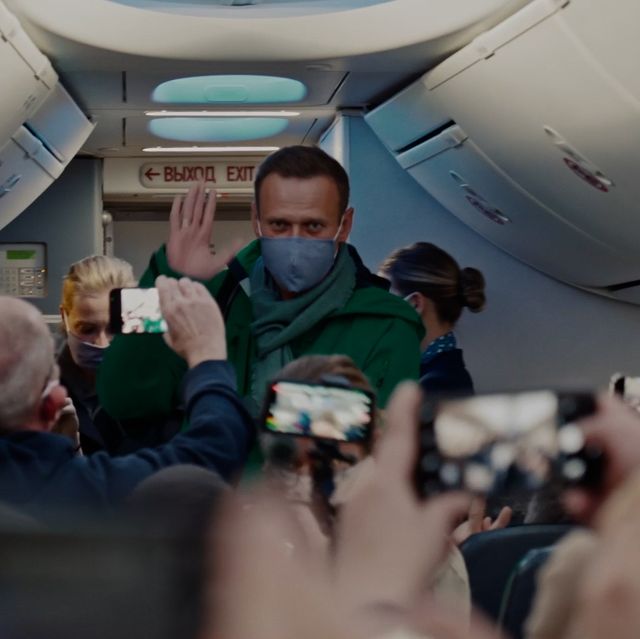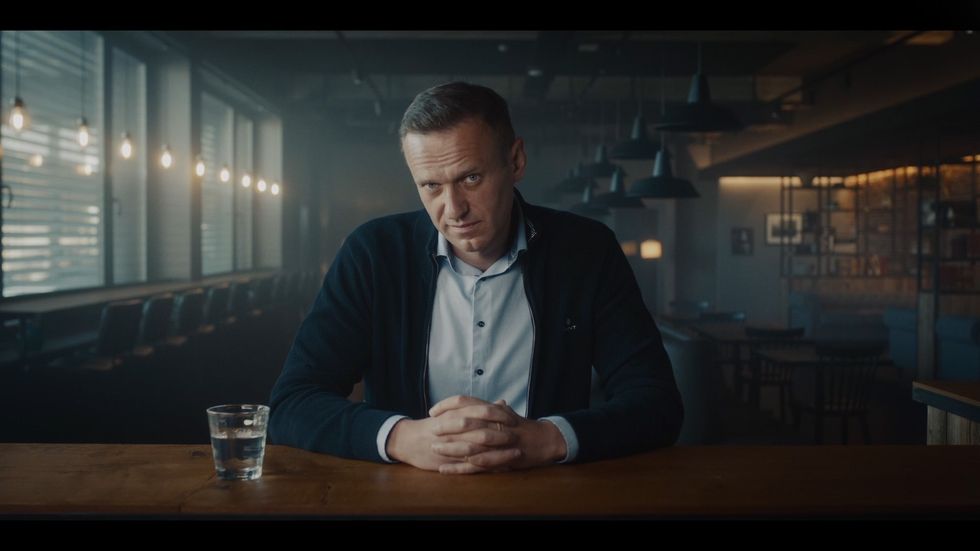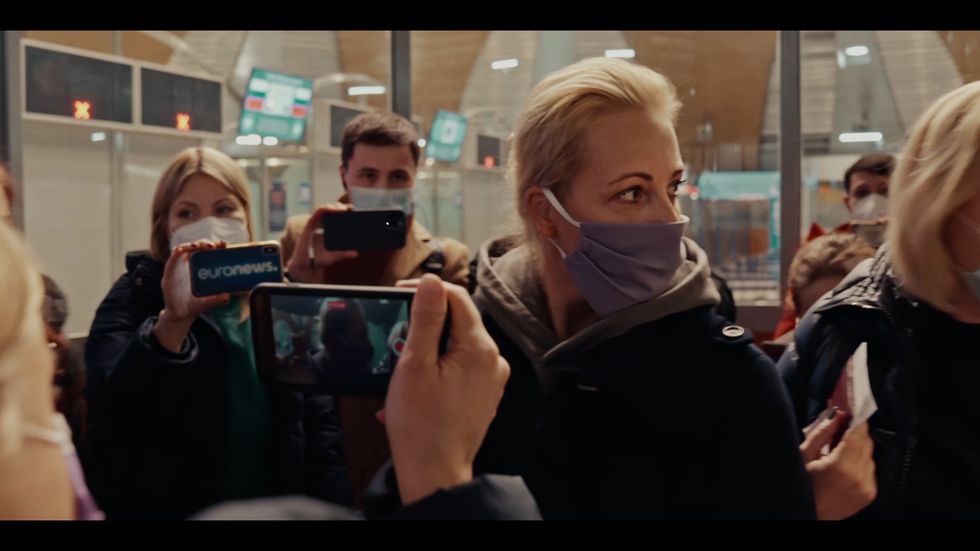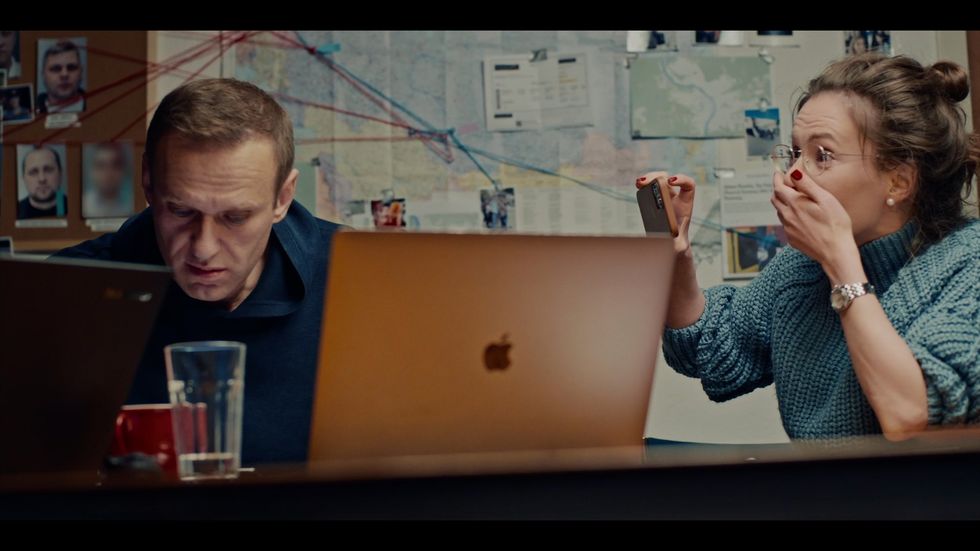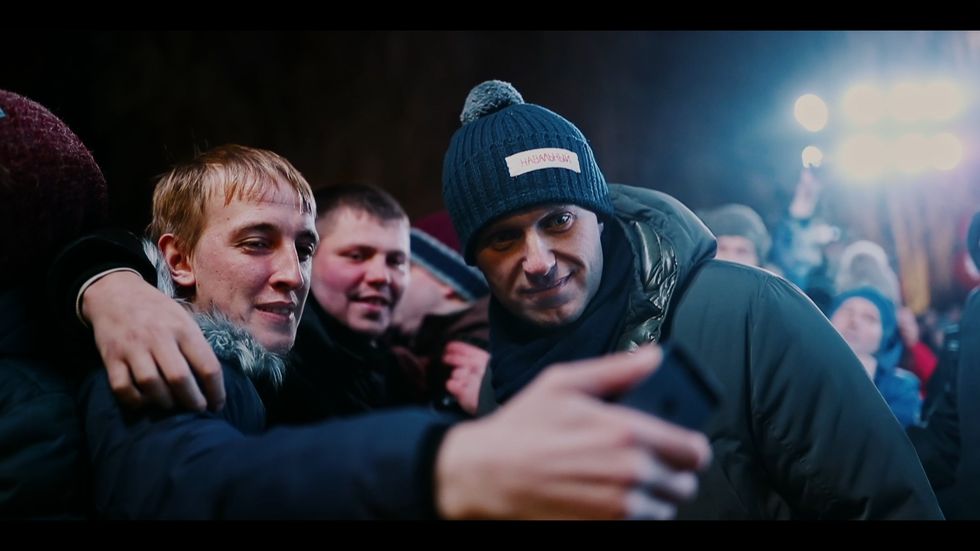In Navalny, a new documentary about the Russian opposition leader and stubborn thorn in the side of Vladimir Putin, Alexei Navalny, one eye is firmly fixed on the future. The camera lingers on Navalny's daughter as she discusses the prospect of him being assassinated. At one point, director Daniel Roher asks him outright: “If you are killed, what message do you leave behind?”
The intimate documentary – which was filmed between November 2020 and January of this year – is made in almost breathless anticipation of becoming a historical artefact. It begins in the wake of his attempted poisoning by the Novichok nerve agent, an attack which he miraculously survived after the plane he boarded from Tomsk to Moscow landed in the nick of time. Then, using a mixture of to-camera interviews, footage shadowing him and archival videos, the documentary sets out to prove the attack was state-ordered, the nerve agent itself being something of a smoking gun for the Kremlin's involvement.
Watching it some 40 days into Russia's invasion and brutalisation of Ukraine and its people, it becomes clear that the documentary has its eye on not only Navalny's future, but on the broader endgame of Putin's authoritarian regime.
Navalny comes from Daniel Roher, the director of well-regarded rockumentary Once Were Brothers: Robbie Robertson and The Band, and was filmed in secret to avoid further putting its namesake at risk. It follows Navalny's family - his wife Yulia, and children Daria and Zahar – and tight team as they piece together the brazen assassination attempt on him while hiding out in the German countryside, preparing for his daring return to Moscow.
Alexei Navalny, the handsome 41 year old lawyer, who, as news anchor puts it during the documentary, has "chosen one of the most dangerous occupations in the world, running against the man who controls the Kremlin", has long been one of Putin's most vociferous critics, but it's only now much of the world is really listening.
Spending time with Navalny is a little like watching the people who free-climb mountain ranges, except on this occasion you know for certain the opponent he is attempting to overcome is out to kill him. He is both extremely brave and a little arrogant, fizzing with excitement over the views on his YouTube videos and using the international limelight to his advantage. In one strange segment he somewhat petulantly moans about journalists questioning his flirting with the extreme right in the early stages of his career, where he marched side by side with unpalatable nationalists and racists. “I consider it my political superpower,” he says imperiously. “I can talk to anyone.” Still, the powerful message of Navalny is not so much the man himself but what he stands against.
In the film's climactic scene – one so farcical it resembles a skit from Ashton Kutcher's MTV prank show Punk'd – Navalny poses as a government operative and chastises his would-be killer:a glum scientist who is down about his poison brew not coming good. It's an incredible "gotcha" moment, similar to the indisputable evidence offered in the documentary about Kim Jong-nam's attempted killing, Assassins, or the murder of Saudi journalist Jamal Khashoggi in The Dissident, but these crimes were committed in countries where there is no truth so big it can't be twisted.
As such, Putin counters that the footage of said scientist admitting to poisoning his rival is fake, suggesting in a press conference that Navalny is trying to elevate his celebrity by claiming he is a target. He also blames the CIA, revealing the anti-west position he defaults to when backed into a corner, and one supported by the avalanche of propaganda on social media that he has at his disposal; a machine that we have seen whirring in recent weeks.
One of the most telling lines in the documentary is Navalny's assertion that Putin "wants to reestablish [an] authoritarian regime", and we see this in brutal effect upon Navalny's return to Moscow, where police are arresting his supporters and journalists alike. This scene of chaos and tyrannical rule in action seems like a flashing warning sign for what has come since.
In the 444 days and counting that Navalny has been held in prison, he has only become a greater symbol of resistance against Putin, causing trouble from behind bars with his growing online following and active Twitter account. The power to control the story is something that another Putin adversary, Ukrainian president Volodymyr Zelenskyy, has similarly proven in recent weeks, and Navalny is likewise steadfast in its unwavering message of the need to resist disinformation and intimidation at any cost.
Navalny knows the power of a compelling narrative and delivers a call to arms in the final moments of the documentary. “The message is very simple: do not give up,” he says with a Hollywood pause. “We don't realise how strong we are.” The only problem is, Putin knows the power of a compelling narrative too, and for the time being, it is his that prevails.
'Navalny' is in Curzon cinemas from 12 April, before a UK–wide release 15 May
